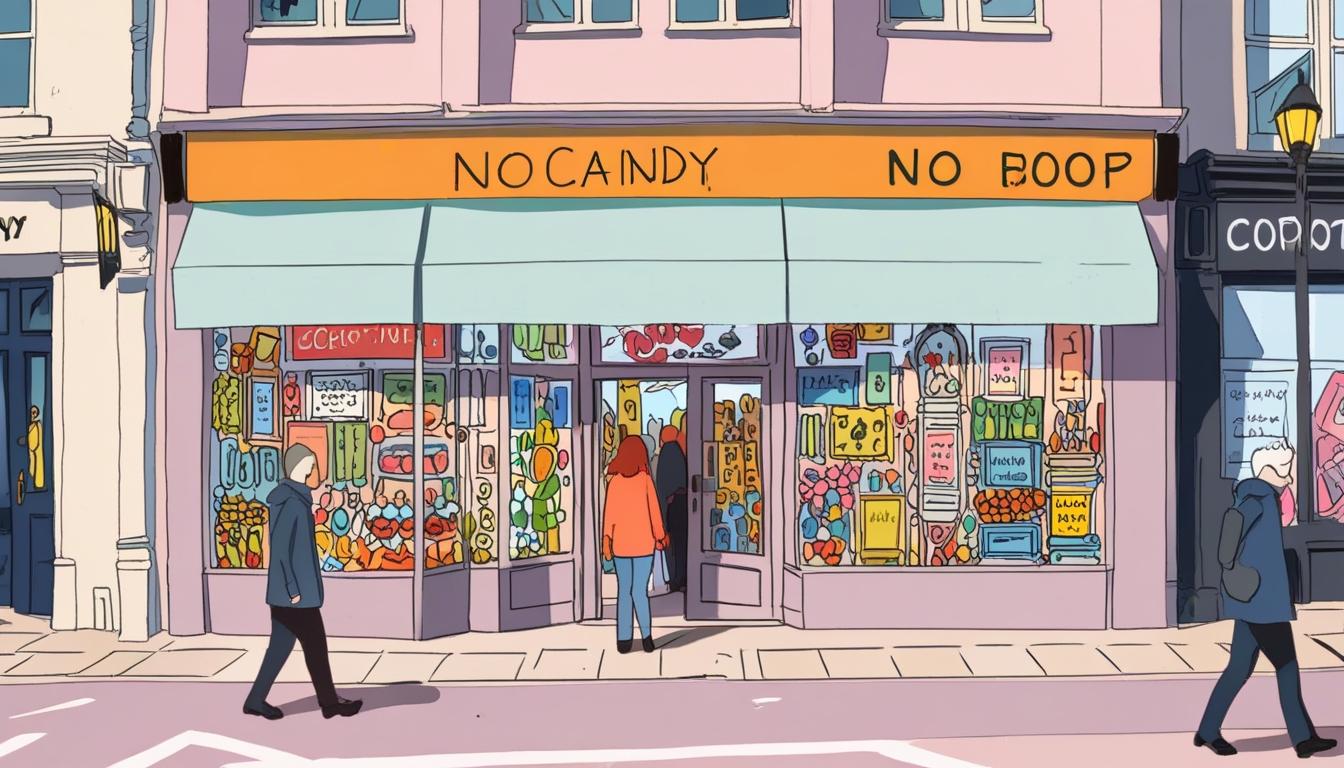Oxford Street's Struggle Against Tacky Candy Shops: A Renewed Fight for Revitalisation
Despite ongoing efforts to reclaim its former prestige, Oxford Street remains besieged by low-quality candy and souvenir shops. Once renowned as London's premier shopping destination, this iconic roadway has been overshadowed by an alarming rise in US-style sweet stores that proliferated during the pandemic, bringing the total to an estimated 40 at one point. The situation has prompted Westminster City Council to intensify crackdowns on these establishments, which have reportedly evaded approximately £9 million in business rates.
As the pandemic left many big-name retailers—which once anchored Oxford Street, including Topshop and Debenhams—vacant, a surge of these candy shops rushed in to take advantage of the empty storefronts. However, council officials have described their attempts to regulate these businesses as akin to playing a game of "whack-a-mole," with new candy shops launching in different locations even as others were shuttered. This enforcement chaos is compounded by a murky network of ownership and the rapid dissolution of non-compliant companies, making accountability a persistent challenge.
In a notable development, the recent closures have seen the number of these candy outlets drop to 18, with the annual business rate arrears decreasing to about £1.4 million. This reduction in numbers has been attributed to several factors, including stricter council policies and a focused effort on returning higher quality tenants to the area. Additionally, publicity through media outlets has highlighted consumer safety concerns regarding the ingredients in the sweets—some of which lack proper labelling, jeopardising public health.
The situation has not been without dramatic incidents. During a raid on one shop in April, police uncovered a secret underground tunnel as they investigated the sale of two bags of sweets for an eye-watering £899. This bust represented one of the largest hauls made during a single operation, with £80,000 worth of potentially dangerous goods seized, illustrating the lengths to which some shop owners are willing to go to exploit tourists.
The ongoing problems have led to broader discussions about the management of retail premises. Local council leaders point to the difficulties posed by landlords who continue renting to these high-risk businesses, as they lack the jurisdiction to regulate economic activity at these commercial properties directly. Adam Hug, leader of Westminster City Council, stated, “Our job is to protect people who visit the West End from being exploited.” He remains hopeful that continued enforcement actions will deter the "rogue US sweet shop trade."
Public health advocates have raised alarms regarding specific items sold in these stores, such as American candies and snacks that contain banned ingredients linked to serious health risks. Among the items confiscated in past operations have been Swedish Fish and Hot Tamales, both notorious for their detrimental additives. The Chartered Trading Standards Institute has likewise warned about the potential dangers associated with certain imported sweets, as such products often bypass regulatory scrutiny.
The challenges that Oxford Street faces extend beyond misguided retail initiatives. The area has seen a rise in crime and homelessness, exacerbating its decline. Incidents earlier in 2023 reached alarming levels when groups of young people incited chaos following a viral social media post, highlighting the increasingly perilous environment in which shoppers find themselves.
Despite these issues, there is a glimmer of hope for Oxford Street's revitalisation. Proposals from London Mayor Sadiq Khan aim to pedestrianise sections of the thoroughfare and replace insubstantial boutiques with flagship stores, ushering in a new era of retail. Recent openings, such as the return of HMV and a new Ikea, signal the kind of transformation some stakeholders hope will further cement Oxford Street’s position as a global shopping destination.
Investments in the area reflect a broader aim to cultivate a more inviting atmosphere, possibly allowing small businesses to flourish in spaces vacated by illicit operations. Initiatives like the £10 million "Meanwhile On: Oxford Street" scheme provide rent-free opportunities for entrepreneurial ventures seeking to contribute positively to the street's ecology.
Dee Corsi, chief executive of the New West End Company, remarked that while candy stores occupy less than 1 per cent of retail space, efforts to discourage their presence are paying off, with significant reductions noted over the previous year. The collective vision for Oxford Street continues to evolve, shaped by a commitment to quality and an ecosystem that prioritises legitimate, responsible retailing. As the area works through these growing pains, one thing remains clear: the fight for a cleaner, safer Oxford Street is far from over.
Reference Map:
- Paragraph 1 – [1]
- Paragraph 2 – [1], [4]
- Paragraph 3 – [1], [5]
- Paragraph 4 – [1], [3]
- Paragraph 5 – [1], [6]
- Paragraph 6 – [1], [2]
- Paragraph 7 – [1], [5]
- Paragraph 8 – [1], [2]
- Paragraph 9 – [1], [3]
- Paragraph 10 – [1], [4]
- Paragraph 11 – [1], [2]
Source: Noah Wire Services
